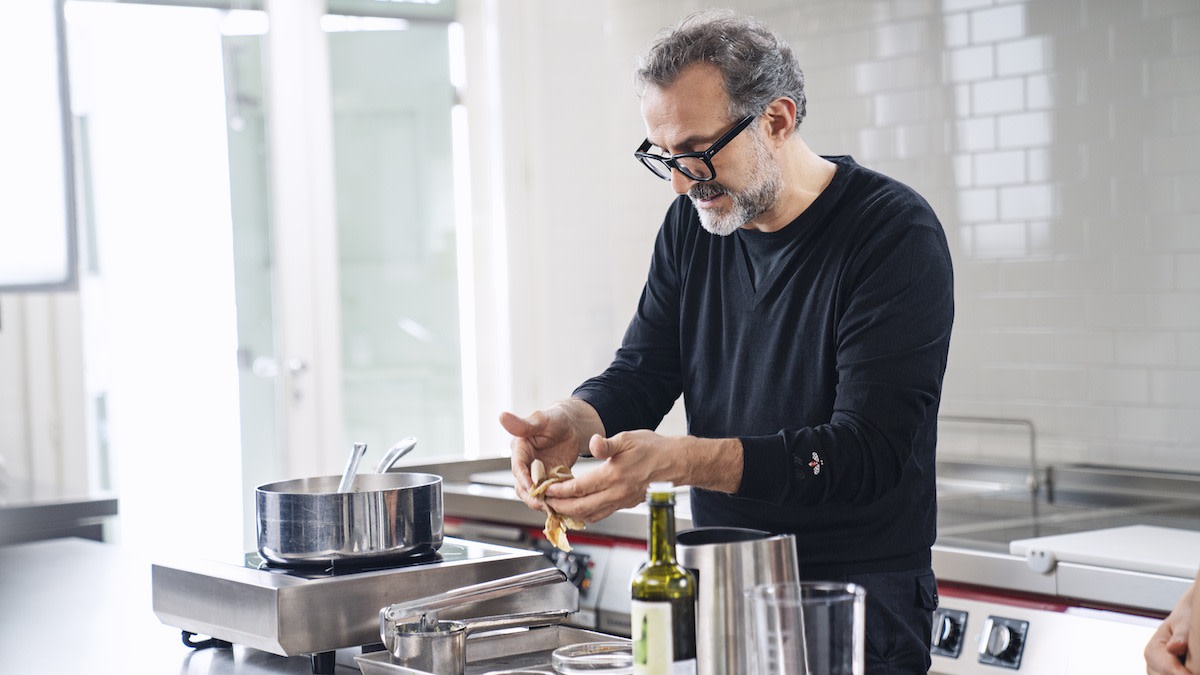Understanding Food Waste: How Chef Massimo Bottura Combats the Global Issue
Written by MasterClass
Last updated: Sep 28, 2021 • 4 min read
The fight to reduce food waste is a major environmental issue in the modern era, crucial to both reducing humanity’s carbon footprint and securing enough food for a growing number of hungry people across the globe.
Learn From the Best
What Is Food Waste?
Food loss and waste categorizes food that is discarded, uneaten, or left to spoil. Food waste occurs at every level of the food supply chain, from production and processing to retail and consumption. Global food waste accounts for approximately one-third of all food produced.
Approximately 50 percent of land and 80 percent of freshwater in the United States goes towards food production. Of that food produced, the Natural Resources Defense Council estimates that up to 40 percent of edible food that is safe to eat is thrown out. In 2010, that amounted to 133 billion pounds of food lost in just one country. Worldwide, total food waste is estimated at about 1.3 billion tons of food. Food waste also generates a huge amount of greenhouse gases, specifically methane—one of the primary contributors to rapid climate change.
In 2013, the United Nations launched a new Food Loss and Waste Accounting and Reporting Standard, which gives countries and their governments educational and strategic resources for fighting the inefficiencies in their food systems—as well as encouraging the combined effort of increased food donation through food banks, instructions around food scraps, and creative initiatives throughout food service industries.
What Causes Food Waste?
There are a number of causes for the losses accrued during food production. Improper handling or poor quality storage during post-harvest transport are responsible for an estimated 20 percent of losses in developed countries and up to 40 percent in developing countries. At the consumer and retail level, good and edible produce is often rejected in grocery stores, restaurants, and homes for cosmetic reasons—a wonky-looking carrot or a slightly bruised plum—and consumers fail to shop or cook as strategically as they could, buying more than they need and not using it in time.
How to Combat Food Waste With World-Renowned Chef Massimo Bottura
- 1. One Plate at a Time. It was during Expo Milan 2015, whose theme was “Feeding the Planet, Energy for Life,” that Chef Massimo first introduced a tangible vision for cooking sustainably and eliminating food waste: He called it Refettorio Ambrosiano, a defacto dining room inside of an abandoned theater in Milan’s low-income Greco neighborhood. (The word refettorio comes from the Latin reficere, meaning to remake or restore.) Using more than 15 tons of food salvaged from the exposition, Massimo—along with more than 65 internationally renowned chefs, including Eleven Madison Park’s Daniel Humm and El Celler de Can Roca’s Joan Roca—made thousands of meals that went to the city’s poor, homeless, and otherwise underserved. It was nothing short of revolutionary.
- 2. Food for Soul. Refettorio Ambrosiano led to Food for Soul, the nonprofit Massimo founded with his wife, Lara Gilmore, in 2016. Its mission is to find a use for the 1.3 billion tons of food wasted worldwide each year, a topic that’s also tackled in Massimo’s cookbook Bread Is Gold. Massimo and Lara have used Food for Soul to front several more refettorios, including Refettorio Gastromotiva (Rio de Janeiro), Refettorio Felix (London), Refettorio Paris (Paris), and two others in Modena and Bologna. Each community kitchen occupies a formerly dilapidated space in its respective city. As he is wont to do, Massimo has brought his love for culture into each of these locations—all have benefitted from the sharp eye of designers and artists who contribute tablescapes and installations. The celebrity-chef concept has carried over from Milan, too: Since Refettorio Ambrosiano’s premiere, more than 130 celebrated chefs have cooked at the various locations, all of whom use their expertise to craft gourmet dishes from proteins nearing their expiration dates and bruised or misshapen (aka “ugly”) produce. When taken as a whole, the elements of each refettorio are meant to revolutionize the idea of a soup kitchen—an idea, Massimo told T magazine in 2016, that is “going to change the dignity of the people.”
In 2017, the Rockefeller Foundation awarded Food for Soul a $500,000 grant to fight food insecurity in American cities. Massimo has set Los Angeles, New York, Detroit, New Orleans, and Miami in his sights, with his goal being to open refettorio projects in two of those locations by the end of 2019. “Everything is possible,” he told NPR about his refettorios in 2016. “If you can dream, you can make it.”
Want to Learn More About Cooking?
Learning to cook better at home takes patience, determination, and more than a little experimentation. No one knows this better than Massimo Bottura, who treats his world-renowned restaurant as a laboratory of ideas. In Massimo Bottura’s MasterClass on modern Italian cooking, the chef of the three-Michelin-star Osteria Francescana shares how he transforms classic, regional Italian recipes into exciting modern dishes. You’ll learn how to make rich, flavorful tagliatelle al ragù, pumpkin risotto, and a MasterClass-exclusive Emilia Burger recipe.
Want to learn more about the culinary arts? The MasterClass Annual Membership provides exclusive video lessons from master chefs including Massimo Bottura, Chef Thomas Keller, Gordon Ramsay, Alice Waters, and more.
